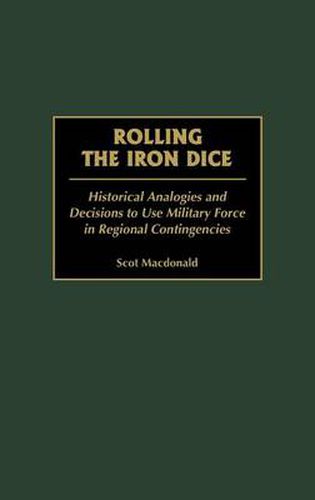Readings Newsletter
Become a Readings Member to make your shopping experience even easier.
Sign in or sign up for free!
You’re not far away from qualifying for FREE standard shipping within Australia
You’ve qualified for FREE standard shipping within Australia
The cart is loading…






Does history provide lessons for foreign policy makers today? Macdonald combines cognitive psychology theories about analogical reasoning, international relations theories about military intervention, and original archival research to analyze the role of historical information in foreign policy decision making. He looks at the role of historical analogies in Anglo-American decision making during foreign policy crises involving the possible use of force in regional contingencies during a crucial period in the 1950s when the West faced an emerging Soviet threat. This study analyzes the influence of situational and individual variables in a comparison of more than ten leaders from two nations facing four different crises.
Rolling the Iron Dice describes the often significant effect of historical analogies on perceptions of the adversary and of allies, time constraints, policy options and risks, as well as the justification of policy in four crises: the 1950 Korean invasion; the 1951-53 Iranian oil nationalization incident; the 1956 Suez crisis; and the 1958 crisis in Lebanon and Jordan. Contrary to both the slippery slope and the escalation models of military intervention, Macdonald argues that leaders decide extremely early in a crisis, often on the basis of an historical analogy, but also based on perceptions of the rationality of an adversary, whether to use military force. Their decision does not change unless the adversary capitulates to every demand.
$9.00 standard shipping within Australia
FREE standard shipping within Australia for orders over $100.00
Express & International shipping calculated at checkout
Does history provide lessons for foreign policy makers today? Macdonald combines cognitive psychology theories about analogical reasoning, international relations theories about military intervention, and original archival research to analyze the role of historical information in foreign policy decision making. He looks at the role of historical analogies in Anglo-American decision making during foreign policy crises involving the possible use of force in regional contingencies during a crucial period in the 1950s when the West faced an emerging Soviet threat. This study analyzes the influence of situational and individual variables in a comparison of more than ten leaders from two nations facing four different crises.
Rolling the Iron Dice describes the often significant effect of historical analogies on perceptions of the adversary and of allies, time constraints, policy options and risks, as well as the justification of policy in four crises: the 1950 Korean invasion; the 1951-53 Iranian oil nationalization incident; the 1956 Suez crisis; and the 1958 crisis in Lebanon and Jordan. Contrary to both the slippery slope and the escalation models of military intervention, Macdonald argues that leaders decide extremely early in a crisis, often on the basis of an historical analogy, but also based on perceptions of the rationality of an adversary, whether to use military force. Their decision does not change unless the adversary capitulates to every demand.